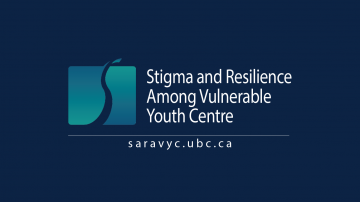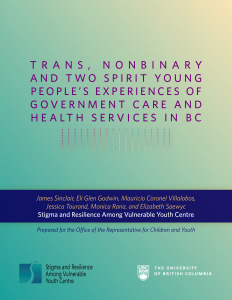Dan’s Legacy Program Evaluation
This study is an evaluation of the substance use, mental health, and wrap-around care provided to marginalized young people by the non-profit organization Dan’s Legacy. Principal Investigator: Elizabeth SaewycResearch Team: Monica Rana, Yeshvi MehtaFunded by: Health Canada
2SLGBTQ+ inclusive education initiatives are essential to fostering safe school environments for all youth–not just 2SLGBTQ+ youth
As the current researchers evaluating SOGI 1 2 3, the Stigma and Resilience Among Vulnerable Youth Centre (SARAVYC) would like to express our support for educational programs that make schools safer for 2SLGBTQ+ children. These programs are vital for the well-being and safety of all children and, to quote the BC Human Rights Commissioner Kasari Govender, “the human rights of LGBTQ2SAI+ people are not up for debate.”
Educator Perspectives on the Implementation and Impact of SOGI 123 in British Columbia Schools
Beginning in 2016 in British Columbia (BC), a program called Sexual Orientation and Gender Identity (SOGI) 1 2 3 was implemented in BC’s elementary and secondary schools, with the goal of creating safe and inclusive environments for students of all genders and sexual orientations. This program is therefore the first of its kind in Canada, and seeks to address the health gap between sexual minority students and their heterosexual peers.
Peer Navigator Effectiveness for HIV Prevention in Street-Involved & Homeless Youth
Reaching street-involved and homeless youth (SIY) and enabling them to make use of the many evidence-based HIV prevention and treatment interventions like antiretrovirals (ART) is critical to achieving the global goal declared by the United Nations of zero new infections and zero HIV deaths by 2030. Canadian sites (London, Toronto, Vancouver) and Kenyan sites (Pioneer and Kitale) all have many underserved SIY who bear a high burden of uncontrolled HIV.
Captaining Inclusion in BC Rugby
The aim of this study is to pilot test the effect of a short, discussion-led social cognitive intervention on homophobic language use, descriptive norms, injunctive norms, and attitudes towards using homophobic language. The intervention will be delivered by professional rugby union players to teenage rugby union teams.
Trans, Nonbinary and Two Spirit Young People’s Experiences of Government Care and Health Services in BC
In 2021, the Representative for Children and Youth in British Columbia contracted SARAVYC to undertake a series of studies using data from the BC Adolescent Health Survey and the Canadian Trans Youth Health Survey to understand the experiences of gender minority youth in government care and accessing health services. For the project, SARAVYC undertook four interrelated literature reviews, data analyses of BCAHS (2018) and CTYHS (2014 & 2019), and interviewed former and current gender minority youth with experiences in government care and health services in the province.
Stressors experienced by parents of sexual and gender minority youth in collectivist communities
Sexual minority youth in British Columbia (BC) feel less supported by parents now than their sexual minority peers did in 1998, especially by fathers. There are few interventions designed for families, and almost all are group-based approaches in urban centres, with limited evaluation of their outcomes. Studies have shown the effectiveness of on-line and text-messaging approaches in sustaining health behaviour change, including by our research team, and such interventions can bypass barriers and access issues for parents and youth, even in rural areas (e.g., privacy, transportation, competing life demands, lack of available local professionals).
The Right to Thrive: An Urgent Call to Recognize, Respect and Nurture Two Spirit, Trans, Non-Binary and other Gender Diverse Children and Youth from the Representative for Children and Youth
In Representative Charlesworth’s own words, “Let’s be clear: young people have the right to be who they are and to thrive…The hate speech and anti-trans legislative efforts we have seen recently in Canada and the United States is alarming and is causing great harm.
Report Launch: Representative for Children and Youth release The Right to Thrive: An Urgent Call to Recognize, Respect and Nurture Two Spirit, Trans, Non-Binary and other Gender Diverse Children and Youth
In Representative Charlesworth’s own words, “Let’s be clear: young people have the right to be who they are and to thrive…The hate speech and anti-trans legislative efforts we have seen recently in Canada and the United States is alarming and is causing great harm.
2018 BC Adolescent Health Survey Methodology
Background The BC Adolescent Health Survey (BC AHS) has been conducted in BC public schools approximately every five years since 1992. The 2018 BC AHS was the sixth wave of the survey. The survey monitors the health promoting and health risk behaviours of youth in Grades 7–12 (12–19-year-olds), and is used to inform policies and […]




